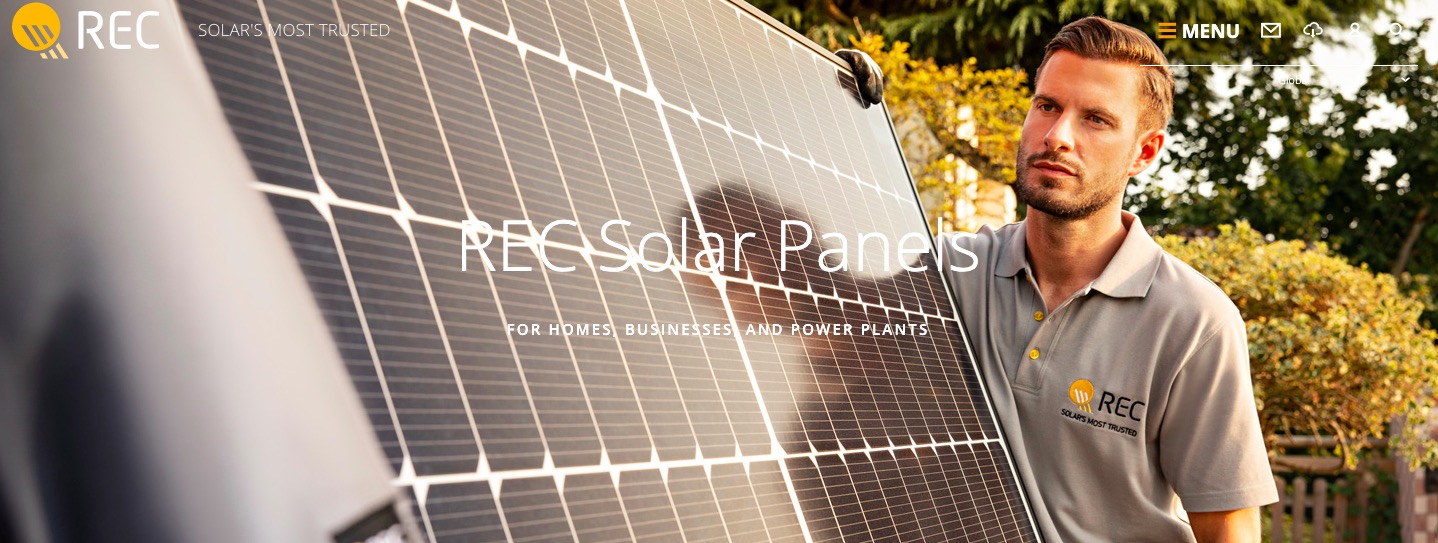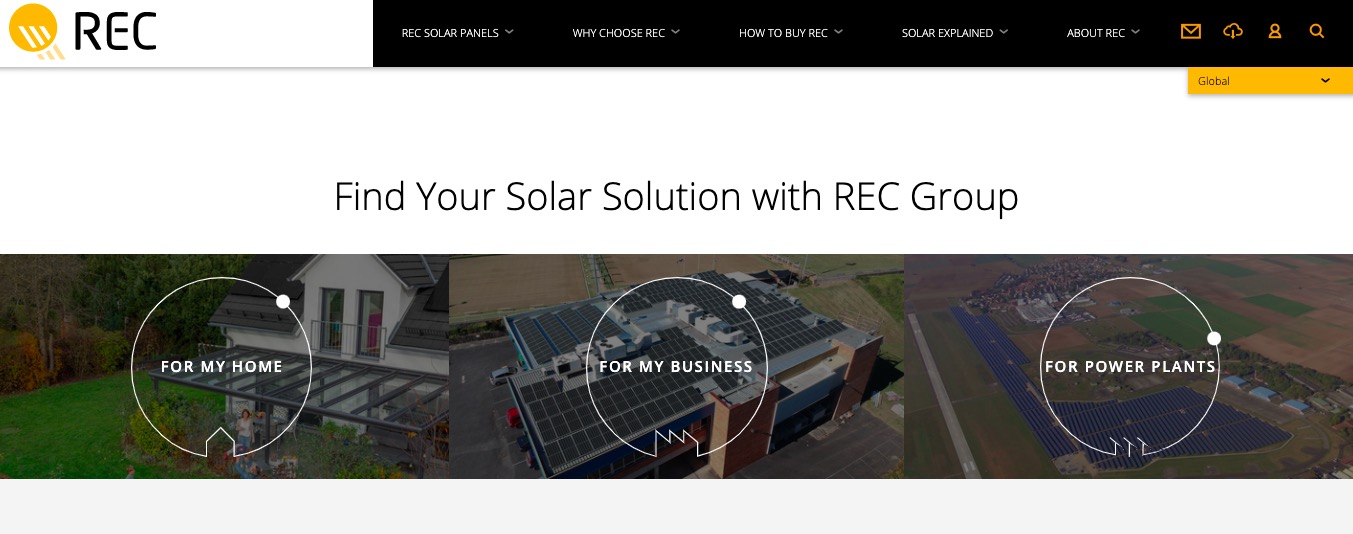The Renewable Energy Corporation (REC) was founded in 1996 by a group of entrepreneurs in Norway, where they started producing solar cells and materials for photovoltaics applications and wafers. The company’s story was a bit troubling, as REC was forced to shut down all solar cell production in Norway in 2011 because of negative market conditions. The company moved its headquarters to Singapore, where it currently leads one of the most important solar panel productions worldwide.
Even though they still have to catch up with the Chinese solar manufacturers, REC is growing fast and now employs more than 2000 people all over the world in their fully vertical company. Fully vertical means that they are in control of every single component being produced, so they can guarantee their quality with total certainty.
Overall Ratings
- Quality: 7.9
- Performance: 8
- Warranty and tech support today: 8.7
- Warranty and tech support long-term: 9
- Price: 7.5
- Value for money: 8.8
Pros and Cons

Manufacturing Locations
The REC group is currently the largest solar panels manufacturer in Europe. It used to manufacture predominantly in Norway and other European countries like Sweden but has a few years ago moved to their high manufacturing plant in Singapore where they preside over a fully automated and integrated production line.
Different Types Of Solar Panels REC Offers
REC offers a variety of solar panels perfect for either residential or commercial systems. Because they are many, in our REC solar panels review, we will mainly focus on six. These include the new series, Alpha, which came out recently and offers top solar cells quality specially designed for powering houses.
- Twinpeak 2
- Twinpeak 2 Mono
- N-Peak
- N-Peak Black
- Alpha
- Alpha Black
Below we will provide you with key specs regarding some of the models listed above so you have a better understanding on what to expect. More specifically, this is the data regarding three models from the Twinpeak 2, the N-Peak, and the Alpha series, respectively.
| Model | REC295TP2 | REC320NP | REC360AA |
| STC Rating | 295.0 | 320.0 | 360.0 |
| PTC Rating | 272.4 | 299.2 | 274.0 |
| Open Circuit Voltage | 39 V | 40.8 V | 43.9 V |
| Short Circuit Voltage | 9.65 A | 10.07 A | 10.49 A |
| Power Tolerance | 0/+5 W | 0/+5 W | 0/+5 W |
| Weight | 40.8 lbs | 39.7 lbs | 43 lbs |
| Length | 65.9 in | 65.9 in | 67.8 in |
| Width | 39.25 in | 39.25 in | 40 in |
| Height | 1.5 in | 1.1 in | 1.2 in |
Even though every panel and series has its own characteristics and advantages, as well as disadvantages, we wanted to quickly mention how the Twinpeak 2 Mono won the Intersolar award on several occasions, making it among the most successful in the REC catalog and a favorite of many. What makes it so good? A combination of high technology, innovation, and pioneering solutions that enable the panel to get more power per square feet than any other model.
What Makes REC Panels Unique?
REC solar panels are perfect for homeowners who want to invest in solar energy but have little space on their roof to do so. That is possible thanks to REC’s ability to produce less number of cells, which will occupy less space but still capable of reaching high power.
Being born in Norway, one of the countries least exposed to the sun’s radiation, it does not come as a surprise when noticing that REC modules have the better output on cloudy days than all the competition, standing at an efficiency rating of about 6%. To go in more detail on this point, REC have developed a line of photovoltaic panels that are made of 120 half-cells instead of the more traditional 60. Such a structure was designed to provide high outputs of power even in shady occasions: when shades appear, output decreases; but if there are more cells on a wider surface, then the panel can gather more sunlight, and thus, in turn, efficiency raises. Even when there’s little sun.

Performance
In REC Solar panel reviews, the way we tend to measure performance is through the temperature coefficient. Generally, a solar panel will perform worse in certain meteorological conditions, namely when temperatures are too hot. As a convention, the set temperature is 25 °C: if the temperature goes above that number, then the panel will start losing its efficiency. By how much? That is precisely determined by the temperature coefficient.
Let’s make an example: a REC solar panel has, on average, a temperature coefficient ranging from 0.26% to 0.37%, depending on the model. Let’s say we buy a panel with a coefficient of about 0.29%. Every time the temperature is one grade over 25, then the panel’s production will drop about 0.29%. As you can see, the drop is minimal and much lower compared to other companies, and makes REC one of the best manufacturers in this field.
Efficiency
Solar panel efficiency is the ability of a panel to capture sunlight and turn it into electricity. REC solar reviews all agree on the fact that the company builds solar panels with a decent enough efficiency rate. Typically, standard panels have an efficiency range of about 14% to 18%, while REC ones go a step further and range from 16.5% to a very impressive 21.7%. Efficiency is one of the most important aspects to keep into consideration when buying a solar panel, and REC does a great job at leading the market in that.
Cost
Even though it is difficult to make an exact estimation on the panels’ costs, as they depend a lot on the model, currency, and the country you are buying them from, we can make a general take and place the cost of REC solar panels at about $2.60 to $3.60. Therefore, for the installation of an average panel of 6 kW would have a price ranging from $15,500 to $21,600.
Remember that there are a lot of incentives and bonuses from local or national governments, or even free quotes, that are often able to grant you in case you decide to go for solar energy, so keep in mind that the price will likely be lower than the one we estimate here or in other REC solar reviews.
REC Solar Panels Warranty
REC claims to hold the lowest warranty rate on the market. Even though it is difficult to verify such a claim, the company does score very good in this department according to independent and internationally acclaimed testing programs and services like the DNV-GL. We have often said the company works hard in improving their services and products, and this is also proven in terms of warranty. If until a few years ago the product’s warranty only lasted 10 years, nowadays you get a 20-year warranty, plus a 25 years performance warranty on most of the models available.
About retained power, it depends on the series you choose. For example, the N-peak series guarantees a minimum of 86% retained power output during the first 25 years, while the Alpha series definitely does better in this regard and states a retained power output of an astonishing 92%.
Are REC Panels Right for You?
REC panels are right for everyone, but especially for homeowners living in cloudy countries. Why so specific a description? Well, we have seen that these panels are perfect for those who don’t have large spaces on their roofs at their disposal, therefore many, perhaps most, homeowners. We also specified the location because we have seen how good REC solar panels work in conditions in which the sun is barely there, as they are able to capture better sun rays and transform them into electrical power.
Final Advice
The REC solar panels are definitely a good, reliable option if you are looking for a new solar panel. As you have seen throughout our review, REC is one of the best photovoltaic cells manufacturers and has received numerous awards for their innovative, high-quality designs and products. The warranty guarantees exceptional performance even after decades, and the launch of the new Alpha series shows the commitment the company has to always improve and bring new technologies to the solar cells market.